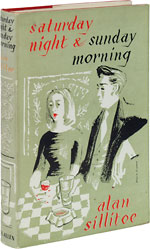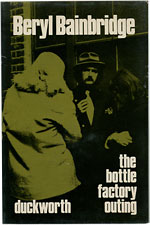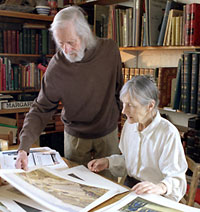Down and Out in London
The passing of two major British authors, a political memoir bandwagon, and the return of a book thief By Stephen Maughan Stephen Maughan is a freelance journalist and book collector based in Sussex, England.
Lovers of British literature are mourning the passing of two towering figures, with the recent deaths of Alan Sillitoe and Dame Beryl Bainbridge. Sillitoe was an outstanding writer of gritty realism novels, depicting outsider characters living in a unsympathetic world, be it the rebellious young factory worker Arthur Seaton in Saturday Night and Sunday Morning (1958), or the jaded housewife trapped in an unloving marriage in Her Victory (1982). His remarks shortly after his eightieth birthday in 2008 are a fitting tribute: “There must have been a point in my life where I had to choose between living and writing, and I chose writing. Of course, that doesn’t mean you aren't attached to life through troubles and so on. But you have to know in which direction your spirit wants to go and never lose sight of that.”
Dame Beryl Bainbridge, who was often referred to as a “national treasure” was an eccentric writer, chronicling dark tales of human tragedy including the disturbing schoolgirl murderers of Harriet Said (1972). She was short-listed for the Booker Prize five times and won the Guardian Fiction Prize for The Bottle Factory Outing (1974). Bainbridge’s world was one where bitterness and despair lurked just underneath ordinary life. She claimed to write as a way to deal with her traumatic childhood, once confessing to the respected psychologist Anthony Clare, “From a writer's point of view, it was an ideal childhood.”
We’ve had a change of government here in Britain following thirteen years of Labour government (ten years for Prime Minister Blair, and three years for his arch rival Gordon Brown), and both collectors and historians are witnessing a dramatic race for those involved to pen their political memoirs. First off the block is the equally despised and admired Alastair Campbell, well known here as Blair’s master of communications—spin doctor—but perhaps better known in the U.S. as the inspiration behind the hard line Malcolm Tucker character in the Oscar-nominated film In the Loop. Campbell’s Prelude to Power has won much praise for its honesty and entertaining style, whilst Brown shopped his memoir around, finally landing a deal last week with Simon & Schuster's Free Press imprint. Not to mention Peter Mandelson's book, The Third Man, which is stirring up debate as it sits atop the bestseller charts. Blair’s book, A Journey, is due to hit stores on September 2, and some collectors are probably already eyeing a signed copy to shelve next to their Margaret Thatcher memoir—a signed first edition of which sells for hundreds. Time will tell whether any of these will come close to the amount that a signed Churchill can command.
An Edinburgh prison library has won the 2010 UK Libraries Change Lives Award. The library, designed by staff and prisoners, opened late in 2008 and is called the only prison in Scotland with a waiting list. Not surprisingly, crime dominates the fiction, but there are also works on history, arts, sports, and poetry. Before the new library was built only five percent of inmates checked out books, but now fifty percent do.
The recent crimes of the so-called “Tome Raider” continue to shake the genteel British book world. The book thief, a.k.a. William Jacques, first came to fame in 2002 after it was revealed he had stolen more than £1 million of rare books in the late 1990s from prestigious British libraries. Despite serving a four-year prison sentence, Jacques has been up to his old tricks again. This past June he was found guilty of stealing thirteen volumes of Nouvelle Iconographies des Camellias, worth up to £40,000, from the Lindley Library of the Royal Horticultural Society in London. The former Cambridge student, possessing what police have called a “very intelligent mind,” would hide valuable books under his tweed jacket as he left the building. There is concern among Britain’s libraries that despite the notoriety of his 2002 court case, nobody seemed to recognize him in person, and only called the police after staff saw him place a book under his jacket. On July 20, Judge Michael Holland sent the 41-year-old Jacques back to prison for the Lindley Library theft. He told the book thief, “The effect of your criminality was to undermine and destroy parts of the cultural heritage that’s contained within these libraries.”
Magazine editors and collectors have sent sympathy wishes to the Mary Evans Picture Library, whose founder Mary Evans passed away in late June at the age of 74. Evans, along with her husband Hilary, were avid book collectors with a particular passion for what the London Times called “quirky historical images of everyday life in Britain.” Indeed Evans and her library, which contained tens of thousands of images, were so renowned among editors that it was not uncommon for a magazine to simply send Evans a proof of an article and leave it entirely up the Picture Library to choose images to fit the feature. Mary and Hilary Evans spent years collecting rare children’s literature and Victorian illustration before turning their hobby into a business in 1964.













